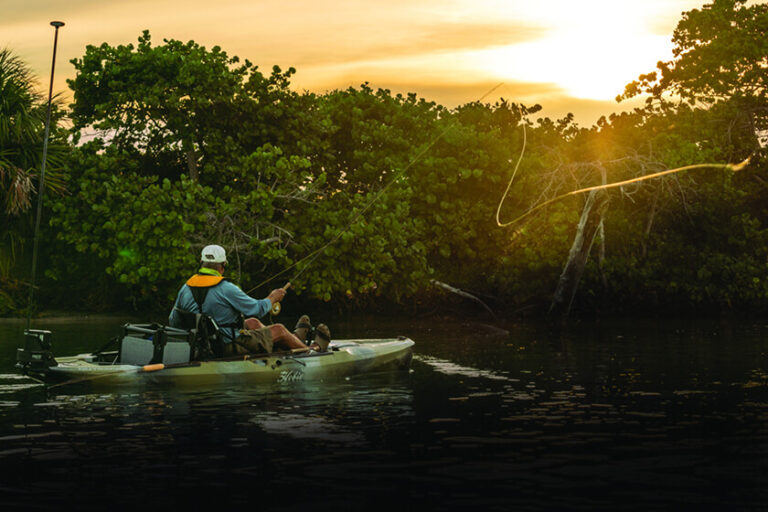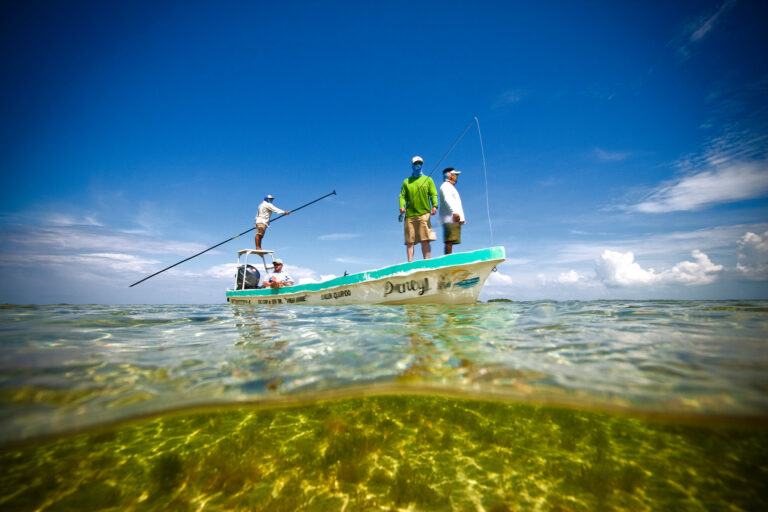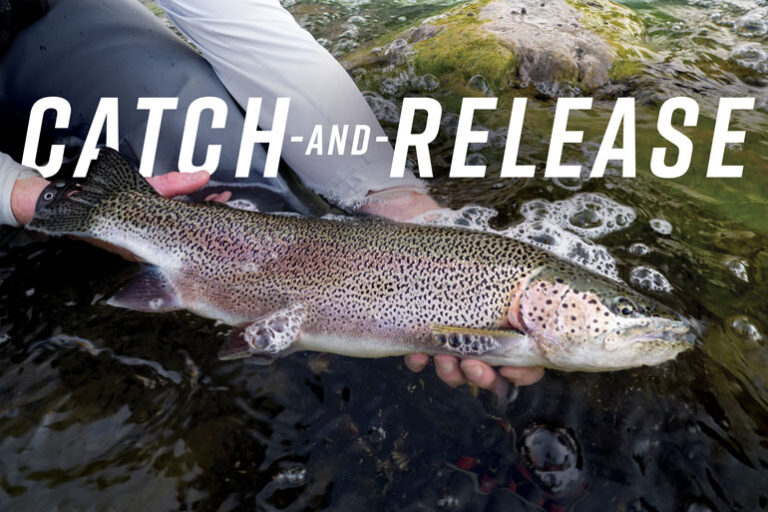To avoid spooking fish while flats fishing, use lighter tackle and lures, move quietly and slowly, and avoid making sudden movements or loud noises. When fishing in shallow water, be mindful of your boat’s shadow and avoid dropping anchor too close to the fishing area.

Credit: www.flyfisherman.com
Understanding Fish Behavior On Flats
The success of flats fishing depends significantly on understanding fish behavior in shallow water environments. By gaining insight into how fish react in these habitats, anglers can increase their chances of a successful catch. Here are some key points to consider:
- Fish are naturally cautious in shallow waters due to their vulnerability to predators. They rely on camouflage and the cover of their environment to stay safe.
- Some species of fish tend to be more skittish than others, such as bonefish and permit, while others, like redfish and snook, may be less easily spooked.
- Fish on flats are highly sensitive to vibrations and noises in the water. Even a small disturbance can startle them and send them darting away.
- Changes in light conditions, such as sudden shadows or movements, can trigger a fish’s flight response.
- Fish use their lateral line system to detect movement and changes in water pressure. Anglers need to be mindful of their own movements and the impact they may have on nearby fish.
- Flats fish have keen eyesight and can detect the presence of anglers. The color of clothing, movements, and the silhouette created on the water’s surface can all alert fish to potential danger.
Factors That Can Spook Fish On Flats
To avoid spooking fish while flats fishing, it’s essential to be aware of the factors that can startle them. Here are some common culprits:
- Loud noises, such as banging on the boat or dropping equipment, can send fish scattering. Keep noise levels to a minimum and avoid sudden, jarring movements.
- Wading too loudly can create vibrations that alert fish to your presence. Walk slowly and purposefully, gliding your feet rather than stomping.
- Casting shadows across the water can make fish uneasy. Position yourself and your boat to prevent your shadow from falling on the area you want to fish.
- Poorly presented casts, such as splashing the bait or fly onto the water’s surface, can send fish fleeing. Practice precision casting and aim for gentle presentations.
- Dragging the lure or bait across the bottom can create unnatural movements and vibrations. Use a light touch and allow your offering to move with the current or mimic natural behavior.
The Importance Of Stealth And Awareness
To avoid spooking fish on flats, stealth and awareness are crucial. Here’s why:
- Stealth allows anglers to approach fish undetected, increasing their chances of a successful catch. It involves moving quietly, keeping gear well-organized and free from unnecessary noise, and minimizing disturbances to the water.
- Being aware of your surroundings means constantly scanning the water for signs of fish activity, such as tailing or waking fish. Look for changes in water color, movement, or disturbances that may indicate the presence of fish.
- Practicing situational awareness also involves observing other anglers and their movements. Respect their space and be mindful of the impact your actions may have on their fishing experience.
By understanding fish behavior on flats, being mindful of factors that can spook them, and prioritizing stealth and awareness, anglers can increase their chances of a successful flats fishing excursion. Through practice and attention to detail, you’ll be well on your way to becoming a skilled flats angler.
So, next time you head out to the flats, tread lightly and be one with the environment – the fish will thank you.
Tips For Avoiding Spooking Fish
When it comes to flats fishing, one of the biggest challenges is avoiding spooking fish. Making too much noise or sudden movements can cause fish to scatter, making it harder to hook your target. To increase your chances of a successful fishing trip, there are several tips and techniques you can follow:
Choosing The Right Gear And Equipment
- Select gear and equipment that is lightweight and easy to handle, reducing the risk of accidental noise or disturbance.
- Opt for high-quality fishing gear and tackle that is specifically designed for flats fishing.
Selecting The Appropriate Fishing Line
- Use a low-visibility fishing line to prevent fish from being spooked by its presence in the water.
- Consider using braided or fluorocarbon fishing line for their excellent strength and invisibility.
Optimal Rod And Reel Selection
- Choose a rod and reel that is suitable for flats fishing, with the right combination of sensitivity and power.
- Make sure the rod and reel are properly matched to the type of fish you are targeting.
Practicing Stealth And Quiet Movement Techniques
- Move slowly and deliberately, avoiding rushed or sudden movements that could startle nearby fish.
- Use soft steps and avoid stepping on rocks or other objects that may create unnecessary noise.
Moving Slowly And Quietly On The Flats
- Take your time while navigating the flats, allowing yourself to observe the surroundings and spot fish without causing disturbances.
- Stay aware of your surroundings and adjust your movements accordingly to avoid sudden noises or vibrations.
Minimizing Noise And Vibrations
- Be cautious about any unnecessary noise or vibrations that could spook the fish.
- Avoid dropping items in the boat or on the deck, and try to keep the noise level to a minimum.
Camouflage And Blending Techniques
- Wear clothing that matches the natural colors and patterns of the environment.
- Consider investing in camouflage gear that allows you to blend in seamlessly with your surroundings.
Using Natural Colors And Patterns For Gear And Equipment
- Choose fishing gear and equipment that mimics the colors and patterns found in the fish’s natural habitat.
- Avoid flashy or unnatural-looking gear that may draw unnecessary attention.
Understanding The Impact Of Shadows And Silhouettes
- Be mindful of the shadows you cast on the water, as they can alert fish to your presence.
- Position yourself in a way that minimizes the creation of shadows and reduces the chances of spooking fish.
Positioning Yourself To Avoid Casting Shadows
- When fishing, position yourself in a way that minimizes the chances of casting shadows on the water.
- Take advantage of natural shade or cover when available.
Casting Techniques To Minimize Silhouettes
- Practice casting techniques that minimize your silhouette, making it less noticeable to nearby fish.
- Keep your movements smooth and controlled to avoid unnecessary splashes or disturbances.
Practicing Proper Boat Positioning
- Be mindful of the position of your boat and how it may affect the fish.
- Avoid anchoring too close to the fishing spot and causing unnecessary disturbance.
Navigating The Flats Without Disturbing Fish
- Familiarize yourself with the layout of the flats to avoid disturbing fish unnecessarily.
- Plan your movements to minimize the disturbance in the water.
Anchoring Techniques For Stability
- Use appropriate anchoring techniques to ensure the stability of your boat without causing excessive noise or vibration.
- Avoid dropping the anchor abruptly, as it can startle nearby fish.
By following these tips and techniques, you can greatly increase your chances of avoiding spooking fish while flats fishing. Remember to be mindful of your movements, use appropriate gear, and practice stealth and quiet techniques to maximize your success on the water.
Happy fishing!
Additional Considerations For Avoiding Spooking Fish
When flats fishing, it is crucial to be mindful of your actions and approach to prevent spooking the fish. In this section, we will explore some additional considerations to help you avoid scaring away fish and increase your chances of a successful catch.
Observing And Interpreting Fish Behavior
- Take the time to observe and understand the behavior of the fish in the flats.
- Look for signs of feeding activity, such as tailing, flashing, or splashing on the surface.
- Take note of the direction in which the fish are swimming and any patterns they may exhibit.
Recognizing Signs Of Nervous Or Spooked Fish
- Spooked fish may display erratic behavior, swimming away quickly or hiding in the seagrass.
- Look for sudden changes in their movement, such as darting or hesitation.
- Pay attention to any changes in the water, like a sudden disturbance or movement.
Adjusting Your Tactics Based On Fish Response
- If you notice fish becoming spooked or uninterested in your bait, try changing your tactics.
- Experiment with different retrieval speeds, pauses, or alternative lures.
- Switch to a lighter line or leader to make your presentation more subtle.
Using Scent And Attractants Strategically
- Scent and attractants can be effective tools for attracting fish without spooking them.
- Use scents that mimic the natural prey of the fish you are targeting.
- Apply attractants sparingly to avoid overwhelming the fish or leaving a strong odor.
Choosing The Right Scents For Flats Fishing
- Consider using scents that match the local ecosystem, such as shrimp or crab scents.
- Research the tendencies of the fish you are targeting to determine their preferred scents.
- Experiment with different scents to find what works best in your specific fishing location.
Applying Attractants To Lure Fish Without Spooking Them
- Apply attractants directly to your lures or baits to enhance their effectiveness.
- Focus on scent application to avoid visually overwhelming the fish.
- Apply the attractant sparingly, ensuring it does not create an unnatural sheen or smell.
Adjusting Fishing Techniques For Spooky Fish
- When encountering spooky fish, it is essential to adjust your fishing techniques accordingly.
- Downsize your baits and lures to match the smaller prey the fish are actively feeding on.
- Opt for lighter, more subtle presentations and avoid aggressive movements.
Using Stealthy Casting Approaches
- Make your casts quietly and avoid splashing or crashing your lure onto the water’s surface.
- Cast beyond the fish you are targeting and retrieve your lure slowly towards them.
- Avoid abrupt movements or excessive noise that could startle the fish.
Adopting Ethical Fishing Practices
- Treat the fish with respect and prioritize their well-being.
- Handle the fish carefully to minimize stress, using wet hands or gloves to prevent damage to their protective slime.
- Practice catch and release techniques, ensuring a proper and safe release of the fish back into the water.
Remember, the more you understand about the behavior of fish and the eco-system you are fishing in, the better your chances of avoiding spooking them. Employ these additional considerations to fine-tune your flats fishing technique and maximize your success on the water.
Conclusion
Navigating the flats while fishing requires finesse, patience, and a thoughtful approach. It’s crucial to understand the behavior of fish and the factors that can spook them. By following the tips mentioned in this blog post, you can significantly increase your chances of avoiding any unnecessary disturbances to the fish.
Remember to be mindful of your movements, keep noise to a minimum, and stay aware of your surroundings. Preparing your gear and employing the right techniques will also contribute to a successful fishing trip. By adhering to these guidelines, you can enhance your flats fishing experience and enjoy more fruitful encounters with fish.
So, get out there and put your newfound knowledge into action, and you’ll be amazed at the results. Happy fishing!



